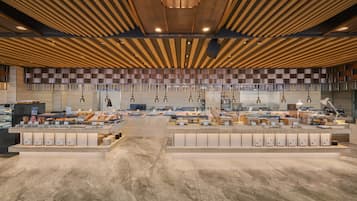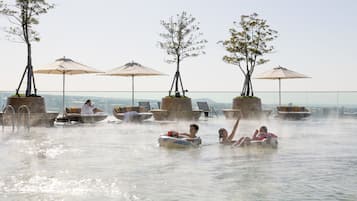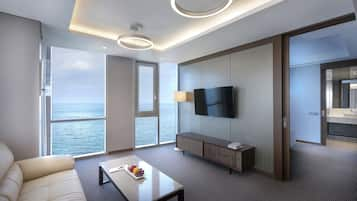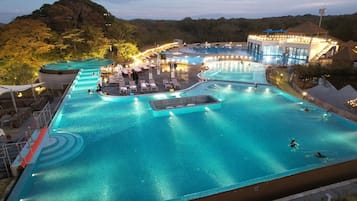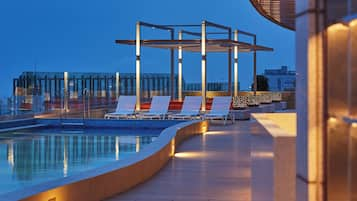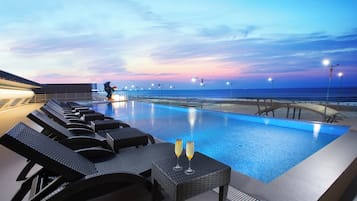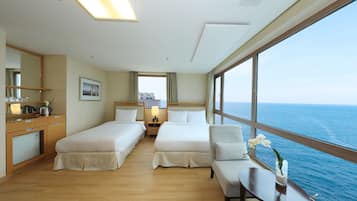Looking for things to do in Jeju on a small budget? For one, simply remember that the stunning nature of Jeju is free for everyone to enjoy. Start from virtually any beach and head toward the lush forests or parks. You can learn about Jeju’s history at the Jeju National University Museum, Seongeup Folk Village, and Jeju 4.3 Peace Park.
People-watching at traditional markets or a tea museum can be fun, too. Want to learn a bit more about places in Jeju that are easy on the wallet? Here we show you that holidays in Jeju don't have to be expensive.
- 1
Yakcheonsa Temple
Experience the peace of this beautiful Buddhist temple

- Budget
- History
- Photo
Yakcheonsa Temple stands a magnificent 30 meters tall, making it one of the biggest Buddhist temples in Asia. The elevated gardens have delightful views of Jeju's breathtaking coastline. The inside of the temple is dominated by a 5-metre-tall statue of Vairocana, with altar portraits of Buddha covering both walls.
Several of the interior rooms occupy natural rock caves. Check out the collection of 18,000 Buddha sculptures inside the main hall, and take the time to admire the enormous temple bell situated outside, which weighs 18 tons. Yakcheonsa Temple also serves food, and there are spaces where you can meditate and experience Buddhist culture.
Location: 293-28 Ieodo-ro, Daepo-dong, Seogwipo-si, Jeju-do, South Korea
Phone: +82 (0)64-738-5000
Map - 2
Jusangjeolli Cliff
A Korean natural monument

- Families
- Photo
Jusangjeolli Cliff is fairly close to the Jungmun Tourism Complex. Jusangjeolli Cliff, which is a solidified lava formation shaped like a column, is unique to Jeju and has been designated as a natural monument of Korea. The contrast between the black Jusangjeolli Cliff and the blue sea becomes even starker on clear days.
There is also a small park with several sculptures nearby, so be sure to stop by and capture some new memories.
Location: 36-30 Ieodol-ro, Seogwipo-si, Jeju-do, South Korea
Open: Daily from 9 am to 6 pm
Map - 3
Hyeopjae Beach
Strikingly beautiful natural features

- Budget
- Couples
- Families
- Photo
The picturesque landscape of Hyeopjae Beach consists of a clear emerald sea and black basalt formed from solidified lava, and just looking around will bring you joy. You can sit back and appreciate the seascape from a small park near the beach.
The nearby Olle Trail takes you along Hyeopjae Beach and its surroundings. The beach is open at night in summer, making it a great place to relax and cool off on a hot night.
Location: 2497-1 Hyeopjae-ri, Hallim-eup, Jeju-si, Jeju-do, South Korea
Map - 4
Seongeup Folk Village
Visit a traditional Korean village

- Budget
- Couples
- Families
- History
- Photo
Seongeup Folk Village is one of few folk villages that maintains the proper look of old Jeju villages. Unlike most other recreated folk villages, Seongeup Folk Village is actually inhabited by locals.
Some of the traditional houses here are run as guesthouses and shops. In addition to thatched houses surrounded by basalt stone fences, there are other historical buildings like Hyanggyo and Seongmun nearby that are worth a look.
Location: 19 Seongeupjeonguihyeon-ro, Pyoseon-myeon, Seogwipo-si, Jeju-do, South Korea
Map - 5
Yongduam
A unique sight formed by lava

- Budget
- Couples
- Families
- Photo
Yongduam, or Dragon Head Rock, is one such natural formation and is a popular tourist spot that anyone can stop to view. Much of Jeju’s topography was formed by solidified lava. The formation is close to the airport and has visitor facilities , such as a parking lot and an observation deck.
If you’re trying to decide where you should begin your Jeju sightseeing, Yongduam should be at the top of your list. Stop by, take a load off, and prepare for your trip while admiring the sea.
Location: Yongdam 2-dong, Jeju-si, Jeju-do, South Korea
Map - 6
Hamdeok Beach
A gorgeous white sand beach in Jeju

- Adventure
- Budget
- Families
- Photo
Postcard-perfect Hamdeok Beach is the prettiest stretch of sand in Jeju. Turquoise-tinged waves lap its sugary white sands, while the tree-studded Seoubong Mountains provide much-needed shelter from the wind. Despite its popularity, these calm crystalline waters are an inviting spot to swim with the little ones – the banana boats and jetskis play a safe distance offshore.
In-between, check out the mosaic-tiled break wall or the historic old lighthouse. There’s also a natural volcanic rock bridge that connects to a tiny island and is a joy to explore. If you’re feeling peckish, the panoramic Cafe Delmoondo does superb iced coffee and bakery items.
Location: Sinbuk-ro, Jochon-eup, Jeju-si, Jeju-do, South Korea
Phone: +82 (0)64-728-3989
Map - 7
Jeju 4.3 Peace Park
Lots of history to tell

- Budget
- Couples
- Families
- History
The Jeju 4.3 Memorial Hall and Peace Park, established to commemorate the Jeju Uprising of 1948, will require plenty of time to fully view. Stories of the victims of the tragedy create a palpable solemn atmosphere.
The 4.3 Peace Park houses part of the Berlin Wall that at one time separated East and West Germany. It’s a beautiful yet painful place that deserves a visit, one that will inspire thought and reflection.
Location: 430 Myeonglim-ro, Jeju-si, Jeju-do, South Korea
Open: Daily from 9 am to 6 pm (closed on the 1st and 3rd Mondays of the month)
Phone: +82 (0)64-723-4344
Mapphoto by GtDX8NNO3Efn2oF6q0s3 (CC BY-SA 4.0) modified
- 8
Bijarim Forest
Walk the trail under centuries-old nutmeg trees

- Budget
- Couples
- Families
- Photo
Bijarim Forest is lush with indigenous nutmeg trees that are hundreds of years old and is a must-see destination for nature lovers. The trails here are well maintained and stay clear of mud even on rainy days. In fact, walking here with an umbrella or raincoat is particularly charming on a rainy day.
Raindrops bring a sense of auspiciousness for an experience unlike any other. The admission fee is reasonable, and you don’t have to worry about getting lost. It’s great when enjoyed with some music and comfortable shoes.
Location: 55 Bijasup-gil, Gujwa-eup, Jeju-si, Jeju-do, South Korea
Open: Daily from 9 am to 5 pm
Phone: +82 (0)64-710-7912
Mapphoto by ProjectManhattan (CC BY-SA 3.0) modified
- 9
Seomun Market
Where you can find local flavors

- Budget
- Couples
- Families
- Food
- Shoppers
Seomun Market is not far from Dongmun Market and not nearly as crowded, making it a great place for avoiding massive crowds. More than anything else, Seomun Market has a well-established restaurant area where you can eat Hanu beef and Jeju black-pig pork purchased at a butcher shop in the market. Plus, the prices are far more reasonable than anywhere else.
What’s more, the restaurants here are known more among Jeju locals than tourists, so you’ll feel as if you’re discovering a hidden secret.
Location: 13-2 Seomun-ro 4-gil, Jeju-si, Jeju-do, South Korea
Open: Daily from 9 am to 8 pm
Map - 10
Jeju National Museum
Browse through different themed exhibits
- Budget
- Couples
- Families
- History
There is no admission fee to Jeju National University Museum, which is located left of the main entrance to Jeju National University. Each floor has a different theme: The first floor is dedicated to the history of Jeju National University and Jeju-Japanese people; the second floor features information about life on Jeju and the third floor has exhibits of indigenous Jeju houses and clothes.
You can also relax with a panoramic view of Jeju National University from the outdoor terrace on the third floor. Don’t let the free admission detract you because there’s plenty to see, and everything is well presented.
Location: 102 Jejudaehang-ro, Jeju-si, Jeju-do, South Korea
Open: Monday–Friday from 10 am to 5 pm (closed on Saturdays and Sundays)
Phone: +82 (0)64-754-2114
Map




